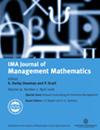预测排球比赛定位差的贝叶斯模型
IF 4.3
3区 工程技术
Q3 MANAGEMENT
引用次数: 3
摘要
我们研究并开发了贝叶斯模型,用于分析由集差记录的排球比赛结果。由于结果变量(集差)具有从$3$到$3$的离散值的特殊性,我们不能考虑基于足球/足球等其他运动中常用的泊松或二项式假设的标准模型。因此,首先也是最重要的挑战是建立适合每场排球比赛定位差的模型。在这里,我们考虑两种主要方法:(a)有序多项式逻辑回归模型和(b)基于Skellam分布的截断版本的模型。对于第一个模型,我们在多项式逻辑回归模型的框架内将集差视为有序响应变量。关于第二个模型,我们调整了Skellam分布以考虑排球规则。我们拟合并比较了具有与Karlis&Ntzoufras(2003)中相同协变量结构的两个模型。使用希腊国家男子排球联赛A1 2016/17赛季常规赛和附加赛的数据,在贝叶斯框架内拟合、说明和比较了这两个模型。本文章由计算机程序翻译,如有差异,请以英文原文为准。
Bayesian models for prediction of the set-difference in volleyball
We study and develop Bayesian models for the analysis of volleyball match outcomes as recorded by the set-difference. Due to the peculiarity of the outcome variable (set-difference) which takes discrete values from
$-3$
to
$3$
, we cannot consider standard models based on the usual Poisson or binomial assumptions used for other sports such as football/soccer. Hence, the first and foremost challenge was to build models appropriate for the set-difference of each volleyball match. Here we consider two major approaches: (a) an ordered multinomial logistic regression model and (b) a model based on a truncated version of the Skellam distribution. For the first model, we consider the set-difference as an ordinal response variable within the framework of multinomial logistic regression models. Concerning the second model, we adjust the Skellam distribution to account for the volleyball rules. We fit and compare both models with the same covariate structure as in Karlis & Ntzoufras (2003). Both models are fitted, illustrated and compared within Bayesian framework using data from both the regular season and the play-offs of the season 2016/17 of the Greek national men's volleyball league A1.
求助全文
通过发布文献求助,成功后即可免费获取论文全文。
去求助
来源期刊

IMA Journal of Management Mathematics
OPERATIONS RESEARCH & MANAGEMENT SCIENCE-MATHEMATICS, INTERDISCIPLINARY APPLICATIONS
CiteScore
4.70
自引率
17.60%
发文量
15
审稿时长
>12 weeks
期刊介绍:
The mission of this quarterly journal is to publish mathematical research of the highest quality, impact and relevance that can be directly utilised or have demonstrable potential to be employed by managers in profit, not-for-profit, third party and governmental/public organisations to improve their practices. Thus the research must be quantitative and of the highest quality if it is to be published in the journal. Furthermore, the outcome of the research must be ultimately useful for managers. The journal also publishes novel meta-analyses of the literature, reviews of the "state-of-the art" in a manner that provides new insight, and genuine applications of mathematics to real-world problems in the form of case studies. The journal welcomes papers dealing with topics in Operational Research and Management Science, Operations Management, Decision Sciences, Transportation Science, Marketing Science, Analytics, and Financial and Risk Modelling.
 求助内容:
求助内容: 应助结果提醒方式:
应助结果提醒方式:


